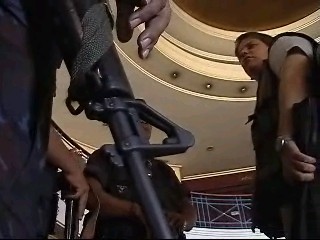Wednesday, April 19, 2006
Reposting in full a column of father Shay Cullen ... his views on the Presidents reciending the death penalty in the Philippines. Very good piece. Please visit PREDA.org for more of his work.
- Mike
- Mike
Abolishing the death penalty is justice and redemption for the poor
By: Father Shay Cullen
(Published in the UK & Ireland, Sunday Examiner HK
The Sunday Times, Philippines and Worldwide by Internet
Archives www.preda.org)
It was a happy moment and a surprise for many when Philippine President Gloria Macapagal-Arroyo announced in a simple statement last Holy Saturday that the Philippines would change its policy of executing convicted criminals. The death penalty, abolished by the constitution, was strangely restored by an act of congress in 1993 amid much opposition by the church and human rights groups.
The chance to confess, repent and make restitution, no matter how heinous the crime, ought to be available for all who are justly convicted.
This is what Jesus of Nazareth taught and practised. Hanging on the cross himself a victim of an unjust conviction and the death penalty. He forgave those who caused his suffering and death. “Father, forgive them for they know not what they do”, he prayed. He forgave the repentant thief, “This day you will be with me in paradise”. The other, who mocked him and was unrepentant was not reprimanded or condemned by Jesus.
Even though victims and their families may want the perpetrator to receive a just punishment can instead become vindictive and demand revenge. They want an eye for eye, a death for a death. No matter how it may seem justified is not the way Jesus would have us behave. Mercy, compassion, belief in repentance and redemption is what we must strive for. Jesus, innocent executed in extreme agony, did not seek revenge but the redemption of the world and the conversion of sinners. We ought to seek no less.
Of the 1205 inmates on the Philippines’ “death row”, many have been wrongfully convicted according to human rights groups representing some of them. Only 230 of these convictions have been affirmed by the Supreme Court. One study citing a decision of the Supreme Court in July 2003 showed that the lower regional trial courts had close to a 72 per cent wrong conviction rate. In reviewing 907 death penalty cases, the Court admitted that 26 were dismissed, 555 modified, 65 acquitted, and 31 remanded. This underlines just how flawed is the system of justice in the Philippines, is that the justices have been trying to reform for years.
Most death penalty sentences are unsafe and those convicted are overwhelming the poor and unable to hire a lawyer. The public defender, no matter how dedicated, is inexperienced, under trained, has no resources or help to investigate the circumstances and uncover evidence that would exonerate his client and expose lies. Convictions are handed down despite the preponderance of reasonable doubt. The rich have the best of lawyers and the power and influence and bribe officials, police and scare off witnesses. They almost never get convicted.
The death penalty was reinstated in the Philippines not because it was a just punishment but because it was a high profile and desperate remedy to quench public anger at the rising tide of heinous unchecked crime.
Kidnapping, murders, rapes extortion rackets, drug trafficking, hold-ups and bank robberies were the daily headlines for many years. Much of it aided and abetted by corrupt police or military. Some even had their own criminal gangs. When they were suspected they eliminated the gang in a spectacular shoot out that solved the crimes and won them a medal. The crime wave of the 90’s abated, not because of the death penalty but because some of the suspect top cops and generals ran for pubic office and won-based on their crime fighting successes.
Despite the efforts of decent and honest politicians to curb crime, many others are linked to it. They are inept corrupt and protected by private armies and hit men. Their links to criminal gangs involved in gambling, drug trafficking and prostitution. They thus accumulate untold wealth and buy their way into office again and again. Thus the cycle of corruption, and the plunder of the treasury goes on and on. Poverty of the majority is a direct result.
The Philippines, despite it’s abundance of highly educated English speaking friendly people, abundant raw resources and skilled work force remains one of the most backward economies in Asia. Most flee abroad at every opportunity and contribute to the growth of the lucky nations who get them. The vastly rich two percent of the population own seventy percent of the land and wealth. What can change that?
The lifting of the death penalty gives children the opportunity to testify against their rapists and abusers whether they are relatives, parents or neighbours. The fear of being blamed by their family for the execution of a rapist father, brother or relative is too much for small children. No matter how they are protected and empowered by therapists and social workers to seek justice and healing the ordeal is too much. In prison the abuser can think about his heinous acts and repent. Now we need the Philippine congress to pass a law and make the President’s word a reality, not just a promise.

